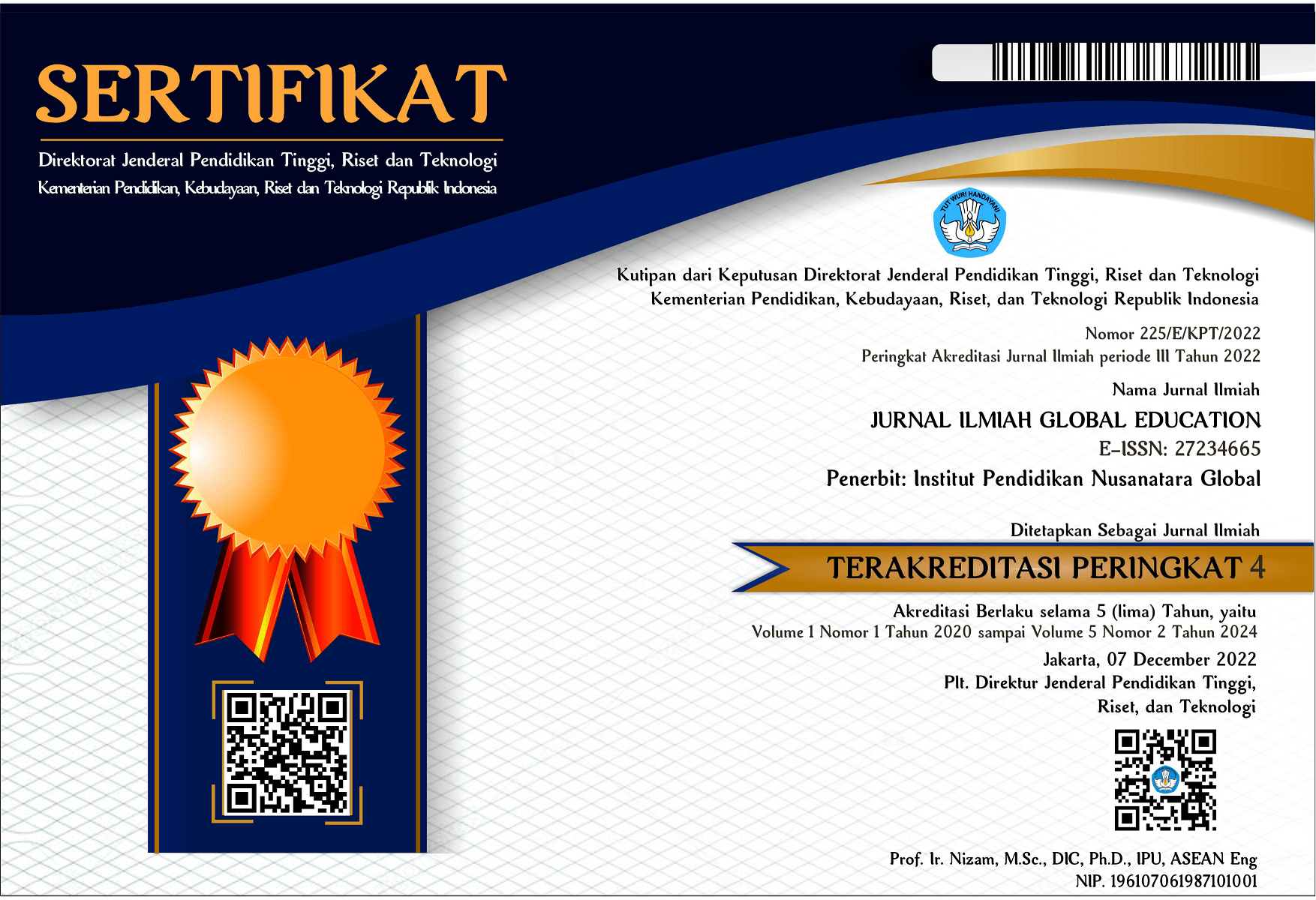Model of Nuclear Energy Policy as An Alternative Energy in Supporting National Defence
DOI:
https://doi.org/10.55681/jige.v5i4.3605Keywords:
Alternative Energy, National Defence, Nuclear Energy, Policy ModelAbstract
This literature review article discusses the nuclear energy policy model as an alternative energy to support national defence. Nuclear energy has great potential as an energy source that can reduce dependence on fossil fuels whose availability is increasingly scarce. However, the use of nuclear energy also has risks that must be managed properly, such as nuclear accidents and the risk of terrorism. Several countries have developed their nuclear energy programs with the aim of meeting domestic energy needs and also as a national defence strategy. However, the development of this nuclear energy program also poses challenges in terms of security and safety. This article discusses the nuclear energy policy model that has been implemented in countries such as the United States, Russia, France, and Japan. In addition, this article also discusses the role of international institutions such as the International Atomic Energy Agency in overseeing nuclear energy programs and ensuring the security and safety of their use. This article also mentions several critical issues related to the use of nuclear energy, such as nuclear waste management, accident risks, and potential terrorism risks. Therefore, the development of a nuclear energy program must be carried out carefully and must pay attention to security, safety, and environmental aspects. In conclusion, the nuclear energy policy model must consider all related aspects, including technical, economic, social, political, and environmental aspects. In this case, the role of international institutions such as the IAEA is very important in ensuring the safe use of nuclear energy and in accordance with international standards.
Downloads
References
Aalto, P., Nyyssönen, H., Kojo, M., & Pal, P. (2017). Russian nuclear energy diplomacy in Finland and Hungary. Eurasian Geography and Economics , 58 (4), 386–417. https://doi.org/10.1080/15387216.2017.1396905
Bukhari, AS (2021). Russia's Rosatom Dominance in the Global Nuclear Energy Market. Journal of Social Politics , 7 (1), 99–108. https://doi.org/10.22219/sospol.v7i1.10755
Danish, Ulucak, R., & Erdogan, S. (2022). The effect of nuclear energy on the environment in the context of globalization: Consumption vs production-based CO2 emissions. Nuclear Engineering and Technology , 54 (4), 1312–1320. https://doi.org/10.1016/j.net.2021.10.030
Hakim, RR Al. (2020). Indonesian Energy Model, Review of Renewable Energy Potential for Energy Security in Indonesia: Literature Review. ANDASIH Journal of Community Service , 1 (1), 1–11. Retrieved from http://jurnal.umitra.ac.id/index.php/ANDASIH/article/view/374
Hsiao, CYL, Ou, Y., Sheng, N., & Wei, X. (2021). Measuring contamination effects of nuclear energy policies and events. International Journal of Energy Research , 45 (8), 11510–11525. https://doi.org/10.1002/er.6421
Ishola, FA, Olatunji, OO, Ayo, OO, Akinlabi, SA, Adedeji, PA, & Inegbenebor, AO (2019). Sustainable nuclear energy exploration in Nigeria - A SWOT analysis. Procedia Manufacturing , 35 , 1165–1171. https://doi.org/10.1016/j.promfg.2019.06.072
Jahanger, A., Hossain, M.R., Onwe, J.C., Ogwu, S.O., Awan, A., & Balsalobre-Lorente, D. (2023). Analyzing the N-shaped EKC among top nuclear energy generating nations: A novel dynamic common correlated effects approach. Gondwana Research , 116 (January), 73–88. https://doi.org/10.1016/j.gr.2022.12.012
Mahmood, N., Danish, Wang, Z., & Zhang, B. (2020). The role of nuclear energy in the correction of environmental pollution: Evidence from Pakistan. Nuclear Engineering and Technology , 52 (6), 1327–1333. https://doi.org/10.1016/j.net.2019.11.027
Mathew, M.D. (2022). Nuclear energy: A pathway towards mitigation of global warming. Progress in Nuclear Energy , 143 (August 2021), 104080. https://doi.org/10.1016/j.pnucene.2021.104080
Muellner, N., Arnold, N., Gufler, K., Kromp, W., Renneberg, W., & Liebert, W. (2021). Nuclear energy - The solution to climate change? Energy Policy , 155 (April), 112363. https://doi.org/10.1016/j.enpol.2021.112363
Neumann, A., Sorge, L., von Hirschhausen, C., & Wealer, B. (2020). Democratic quality and nuclear power: Reviewing the global determinants for the introduction of nuclear energy in 166 countries. Energy Research and Social Science , 63 . https://doi.org/10.1016/j.erss.2019.101389
Pan, B., Adebayo, T.S., Ibrahim, R.L., & Al-Faryan, MAS (2022). Does nuclear energy consumption mitigate carbon emissions in leading countries by nuclear power consumption? Evidence from quantile causality approach. Energy and Environment , (August). https://doi.org/10.1177/0958305X221112910
Peng, L., Zhang, Y., Li, F., Wang, Q., Chen, X., & Yu, A. (2019). Policy implications of nuclear energy's potential for energy optimization and CO2 mitigation: A case study of Fujian, China. Nuclear Engineering and Technology , 51 (4), 1154–1162. https://doi.org/10.1016/j.net.2019.01.016
Ruslan. (2021). Status of Utilization of New Renewable Energy and Nuclear Options in the National Energy Mix. Journal of Nuclear Energy Development , 23 (1), 39–49. https://doi.org/10.1016/j.nucengdes.2014.03.024
Santosa, S., Khotimah, K., Andani, IWS, & Kumaraningrum, AR (2021). Nuclear energy development self-management concept to support national energy security and national defence (case study: Commercial NPP plans in the West Kalimantan region). IOP Conference Series: Earth and Environmental Science , 753 (1). https://doi.org/10.1088/1755-1315/753/1/012050
Septiningsih, I., Kurniawan, ID, & Pratama, MB (2020). Opportunities and Challenges: Utilization of Nuclear Energy Potential Based on Smart Electricity to Maximize the Use of New Renewable Energy as an Effort to Realize Energy Sovereignty in Indonesia. Proceedings of the National Seminar on Applied Technology Research: 2020 , 1–9.
Tolang, PAF, Jivisina Kotan, GM, & Tety Nahak, UN (2020). Environmental Crimes in Relation to the Utilization of Nuclear Energy. Jurisprudence : Department of Law, Faculty of Sharia and Law , 7 (1), 84. https://doi.org/10.24252/jurisprudentie.v7i1.11525
Wang, F., Gu, J., & Wu, J. (2020). Perspective taking, energy policy involvement, and public acceptance of nuclear energy: Evidence from China. Energy Policy , 145 (96), 111716. https://doi.org/10.1016/j.enpol.2020.111716
Zhan, L., Bo, Y., Lin, T., & Fan, Z. (2021). Development and outlook of advanced nuclear energy technology. Energy Strategy Reviews , 34 , 100630. https://doi.org/10.1016/j.esr.2021.100630
Downloads
Published
How to Cite
Issue
Section
License
Copyright (c) 2024 Wahyu Budiarti, Herlina Juni Risma Saragih, Ivan Yulivan, Sovian Aritonang

This work is licensed under a Creative Commons Attribution-ShareAlike 4.0 International License.













